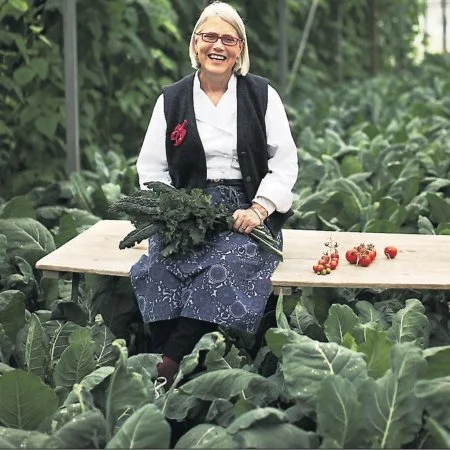Darina Allen on Ireland’s problems with food
Parents can do more to improve kids’ diets, says Darina Allen
Evening Echo, 18 October 2013
RECIPES FOR SUCCESS: Darina Allen says: “Fast food has really done in the family meal.”
Learning to cook can set us free, and give us back the power of choice over what we put into our bodies, adds Darina, who was speaking in Kinsale recently, where she was taking part in the Banter Sessions hosted by Jim Carroll — a series of talks, conversations and discussions about everything, from Madonna and pop culture to running, craft beer and feminism.
Darina was appearing on a discussion panel about our attitudes to food, alongside food blogger Caroline Hennessy (Bibliocook) and journalist Gerry Godley (Lyric FM and Hot Potatoes) at the Black Pig wine bar.
The panel explored how we have come to the point where so few people now know how to prepare their own meals, and have given up all of the power over their food choices to supermarkets, whose primary concern is profits, not the health of customers.
This has given rise to a situation in which supermarkets have driven down the costs of the wrong foods, and it can appear cheaper to buy nutritionally dubious processed foods than fresh fruit and vegetables.
Despite rising obesity levels and associated health problems, Darina insists: “I’m still an optimist.”
But she said in the Kinsale discussion: “The decline in home cooking absolutely mirrors the rise in obesity, and fast food has really done in the family meal.
“It’s not just about health. We learn so many of our skills around the table too. Things like sharing, taking our turn, discussing and arguing without killing each other.
“These are social skills that are really important.”
But there was also recognition on the panel that we are not powerless to address this and there is a role for everyone, from families, communities, schools, the media and government to re-empower people by giving them back the knowledge and skills to make informed choices and act on them. “You need so little to make good food that doesn’t cost a fortune,” said Darina.
“But we do need someone back on television going back to basics to empower people.
“We need to show the basic bit of kit they need to make a few simple meals, and let people build from there.”
She would also like to see schools playing a stronger role in teaching children how to grow things and prepare what they grow, and talked about the Slow Food’s campaign to introduce school gardens in primary schools.
“Families should also be demanding that supermarkets provide crèches so that parents don’t have to bring their children in with them. They shouldn’t be subjected to pester-power while they’re shopping.”
Government has a role to play too. “They’re waking up to the fact that we’re not going to be able to fund the health service in the face of the time-bomb of obesity, and all of the health-related consequences of fast food.
“We need the departments of health, agriculture and education to create a virtuous triangle and set the same agenda where it concerns the health of the nation.
“It’s not just about teaching people, farmers must also be paid properly to produce nutritious food.”
But we don’t need to wait for the Government to step in and do something.
Darina talked enthusiastically about grass-roots movements that are emerging in the US to counter-balance the prevailing forces of supermarkets and what some call the ‘food-industrial complex.’
She said: “People are saying ‘forget the government,’ and they’re doing stuff in their own communities. They’re growing things, they’re giving cooking classes, there’s a huge young agrarian movement, as well as farmers' markets, and guerrilla gardeners.”
And they’re making progress. Thanks to grassroots activism, there are now more than 700 urban farms and gardens in Manhattan, New York, of all places.
As a result, Mayor Michael Bloomberg has changed the by-laws so that people can keep rooftop gardens, backyard chickens and bees.
“For two generations we emphasised academic skills over life skills and we failed them,” said Darina. “People need both skills sets in order to live.
“Instead they feel alienated and they feel guilty. People recognise that food affects their health but without the skills, they’re vulnerable, because skills are freedom.”
Confronted with the need to feed a family, on ever-diminishing budgets, as well as a barrage of conflicting information, families no longer have the knowledge that allows them to shop smart and eat healthily.
There were stark and unwelcome statistics: One-in-four Irish children is obese; our neighbours in the UK spend 38 minutes a day cooking, as opposed to four hours being couch potatoes in front of the television.
Furthermore, cooking has arguably been turned into an overly-stylised, and sometimes lurid, spectator sport, where people spend more time watching someone else doing it on screen than they do in their own kitchens.
The consequences of this are not good. Looking at the always trend-setting USA, obesity and being overweight are the second leading cause of death after tobacco, with massive direct and indirect associated costs.
To take one bizarre example, Americans are spending $3.4billion more on petrol per year than they would if they weighed the same as they did in 1960.
In Ireland, the associated direct and indirect costs of absenteeism and premature deaths for 2009 were estimated at €1.13 billion by Safe Food, the cross-border food safety promotion board.
The same agency released a report this week revealing we are eating less than half of the daily recommended amount of fruit and vegetables.
